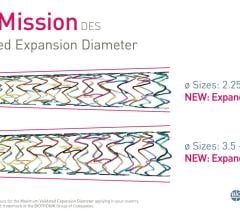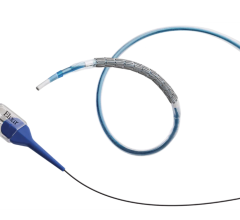July 17, 2007 - Boston Scientific Corp. today announced the implantation of its TAXUS Petal Bifurcation Paclitaxel-Eluting Stent System (TAXUS Petal Stent) in a patient in New Zealand, marking the beginning of the TAXUS PETAL I First Human Use (FHU) Trial, evaluating the safety of a dedicated bifurcation paclitaxel-eluting stent platform for the treatment of coronary artery disease.
The TAXUS Petal Stent is designed specifically to treat both the main branch and the side branch of a bifurcation. The TAXUS Petal Stent consists of a traditional drug-eluting stent with an innovative side structure (the Petal Strut) in the middle of the stent that opens into the side branch. The TAXUS Petal is designed to provide access, coverage and support to the critical areas of the bifurcation and uses a proprietary platinum chromium alloy. Platinum chromium is designed to offer an improvement over stainless steel and cobalt chromium, enabling even thinner struts, increased flexibility and improved radiopacity. The TAXUS Petal Stent is coated with the combination of the Paclitaxel drug and Translute polymer.
The TAXUS PETAL I FHU clinical trial is a non-randomized study with an initial assessment of acute performance and safety (death, myocardial infarction, target vessel revascularization) at 30 days and six months, as well as continued annual follow-up for five years. TAXUS PETAL I FHU will enroll a total of 45 patients in New Zealand, France and Germany. Upon successful completion of this study, Boston Scientific intends to begin a pivotal trial to gain U.S. and international approval for the commercialization of the TAXUS Petal Stent.
The TAXUS Petal Stent is under development and not available for sale.
For more information: www.bostonscientific.com


 July 02, 2024
July 02, 2024 









